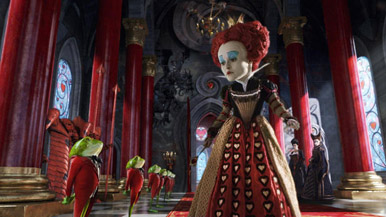Book vs. Movie:
Alice in Wonderland
By Russ Bickerstaff
March 10, 2010
Suddenly there's a small menagerie of creatures. At one point, she decides it might be easier to speak to one of them in French. No reason is given for this. Alice and company eventually find themselves on the shore of the sea of her tears. It's decided that a particularly dry speech could be the best thing to get everyone dry. When that fails, Alice and company decide to have a Caucus Race - an activity that evidently involves everyone running around in a circle for no clearly identifiable reason. At some point, Alice decides that as all of the events she's experienced lately bear little resemblance to the rest of her life, she can't possibly be who she used to be. The book is filled with precisely this kind of dream logic. Alice is perfectly coherent through it all, but there are clear moments where she seems to be every bit as mad as what is going on around her. There's a pleasant kind of madness to it all that holds a subtle darkness. Particularly dark moments include a conversation with a doomed Humpty Dumpty sitting on a wall before the fall everyone knows is going to happen and a conversation with a particularly depressed mock turtle.
Some have chosen to read a deeper darkness into some of Carroll's work. There's little evidence of Carroll's alleged pedophilia. Sexuality (and even sensuality) are pretty far removed from anything present here. One of the more complex allegories in Alice's adventures is the story of the Walrus and the Carpenter - a story that some see as being a statement about organized religion. Whether or not it's an allegory, the idea of a couple of characters luring living creatures onto the dinner plate under false pretenses is pretty sinister on its own. A startling amount of Alice's stories have that kind of darkness. And no matter what she does, she often finds herself verbally abused by strange creatures who she seems to be constantly inadvertently offending. Read the books without preconceptions that it's a kid's story and you end up getting something of a twisted horror story steeped in ambivalent madness that is told with a smile. Carroll is preoccupied with song, poetry and mathematics. It's a dizzying work that is deceptively short and simplistic only on its most superficial level.
The Movie
Tim Burton's Alice In Wonderland is not a strict adaptation of Carroll's books. The story takes Alice into adulthood. She's now 19. A wealthy man is proposing marriage to her. The formal proposal comes as quite a surprise to Alice, who finds herself distracted, racing after a white rabbit she had seen in her dreams as a child. She follows it down the hole and promptly finds herself in a very faithful adaptation of the beginning of her original adventure. It's all lovingly rendered with brilliant detail. Mia Wasikowska is charming as an adult Alice who can't seem to remember having been to Wonderland before. Many of the characters from the book are there and all seem to remember her from her last visit. They have evidently been looking for her for quite some time. It appears that the Red Queen (who, in keeping with the character from the original Disney animated film, is equal parts her namesake and the Queen of Hearts) has taken over the land and is making things generally disagreeable for everyone involved. The world of Wonderland itself is the same fusion between the rabbit hole and the looking glass that the original Disney cartoon was. Bringing the pop Disney sensibilities of the original animated feature into the stylishly darker world of a Tim Burton film is not without its charm, but there's clearly something missing here.
Continued:
1
2
3

![]() Tweet
Tweet
![]() Print this column
Print this column



